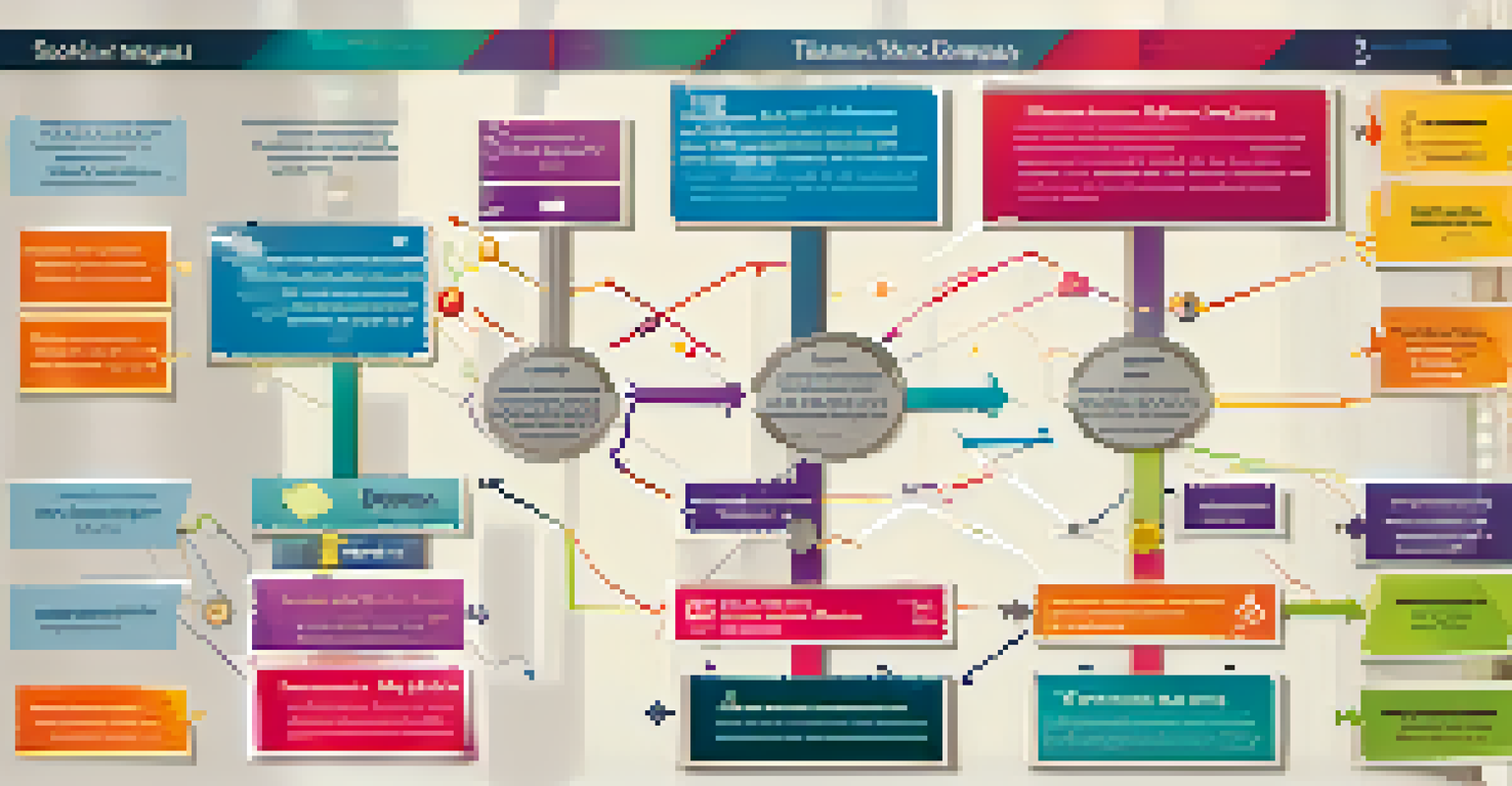Stock Options and Employee Retention Strategies

Understanding Stock Options and Their Benefits
Stock options give employees the right to purchase company shares at a set price, often as part of their compensation package. This creates a sense of ownership and aligns employees' interests with the company's success. When employees feel invested in the company’s future, they are more likely to stay engaged and committed to their work.
Employees who believe they can contribute to a company's success are more likely to stay engaged and committed.
For many employees, the potential for financial gain through stock options can be a compelling motivator. As the company grows and shares increase in value, employees can benefit significantly. This opportunity not only enhances their financial outlook but also fosters a deeper emotional connection to the organization.
Moreover, stock options can serve as a powerful tool for attracting top talent. Prospective employees often evaluate total compensation packages, and stock options can set your offer apart from competitors. This can be especially effective in competitive industries where skilled employees are in high demand.
The Link Between Stock Options and Employee Retention
Employee retention is crucial for maintaining a stable workforce and minimizing turnover costs. Stock options can play a vital role in this by incentivizing employees to stay with the company longer. The longer employees hold onto their options, the more likely they are to see a tangible return on their investment.

Many companies implement vesting schedules for stock options, requiring employees to remain with the company for a certain period before they can exercise their options. This not only encourages loyalty but also reduces the temptation to leave for a competing offer. Essentially, it fosters a longer-term perspective among employees.
Stock Options Boost Engagement
Stock options create a sense of ownership among employees, aligning their interests with the company's success.
Additionally, when employees see their contributions directly impacting the company’s performance and, consequently, their stock options, it reinforces their commitment. This sense of belonging and contribution can be a significant factor in their decision to stay with the organization.
Designing Effective Stock Option Plans
An effective stock option plan should be transparent, easy to understand, and tailored to the needs of the employees. Companies must communicate the value and mechanics of the stock options clearly to ensure that employees grasp their potential benefits. A well-designed plan can make all the difference in employee perception and engagement.
The best way to predict the future is to create it.
Employers should also consider the right balance between base salary and stock options to ensure employees feel appropriately compensated. This balance will vary depending on the industry and the specific employee roles. By customizing the plan, companies can appeal to a diverse workforce with varying financial goals.
Involving employees in the design process can also be beneficial. Seeking feedback and understanding what employees value can lead to a more effective plan that meets their needs and expectations. This participatory approach can enhance the sense of ownership and commitment among employees.
Communicating the Value of Stock Options
Clear communication about the benefits of stock options is essential for ensuring employee buy-in. Companies should provide educational resources that explain how stock options work, including terms like vesting and exercising. This knowledge empowers employees to make informed decisions about their compensation.
Regular updates about the company's performance and stock prices can also keep employees engaged. When employees see that their efforts contribute to the company’s financial success, they are more likely to feel motivated and committed. This ongoing dialogue builds trust and reinforces the value of their stock options.
Retention Through Vesting Schedules
Implementing vesting schedules for stock options encourages employees to stay longer, fostering loyalty and commitment.
Moreover, consider hosting workshops or one-on-one sessions to discuss stock options with employees. These opportunities for direct interaction can help clarify any doubts and demonstrate the company’s commitment to employee growth and understanding.
Aligning Stock Options with Business Goals
Aligning stock options with broader business goals is crucial for maximizing their impact on employee retention. When employees understand how their work contributes to the company’s success, they’re more likely to feel valued and motivated. This alignment fosters a culture where everyone is working towards common objectives.
Companies can implement performance metrics tied to stock options, encouraging employees to meet specific targets. This creates a direct link between individual performance and financial rewards, enhancing motivation. Employees will see their hard work translate into both personal and corporate success.
Additionally, aligning stock options with long-term goals can help cultivate a sense of stability and purpose among employees. When they know their efforts contribute to the company’s future, they are more likely to remain invested in their roles.
Legal and Tax Considerations for Stock Options
Navigating the legal and tax implications of stock options can be complex for both employees and employers. Companies should ensure compliance with regulations to avoid potential pitfalls. Providing clear guidelines and resources can help employees understand their rights and responsibilities regarding stock options.
Employees should also be informed about the tax consequences of exercising their options. Understanding how taxation works can help them make better financial decisions. Offering access to financial advisors can further equip employees with the knowledge they need to manage their stock options wisely.
Clear Communication is Key
Effective communication about the value and mechanics of stock options empowers employees to make informed decisions.
By ensuring clarity on legal and tax matters, companies can foster a more positive relationship with employees regarding their stock options. This transparency builds trust and reassures employees that their interests are being considered.
Evaluating the Effectiveness of Stock Options Programs
Regularly evaluating the effectiveness of stock options programs is vital for ensuring they meet their intended goals. Companies should assess retention rates, employee satisfaction, and overall engagement to determine the impact of their stock options. This evaluation helps identify areas for improvement and adaptation.
Surveys and feedback sessions can provide valuable insights into how employees perceive stock options and their role in retention. By actively seeking input, companies can make informed adjustments that enhance the effectiveness of their programs. This ongoing improvement process keeps stock options relevant to employee needs.

Ultimately, a successful stock options program should evolve with the company and its workforce. By staying attuned to changes in employee expectations and market conditions, organizations can ensure that their stock options remain a compelling retention strategy.